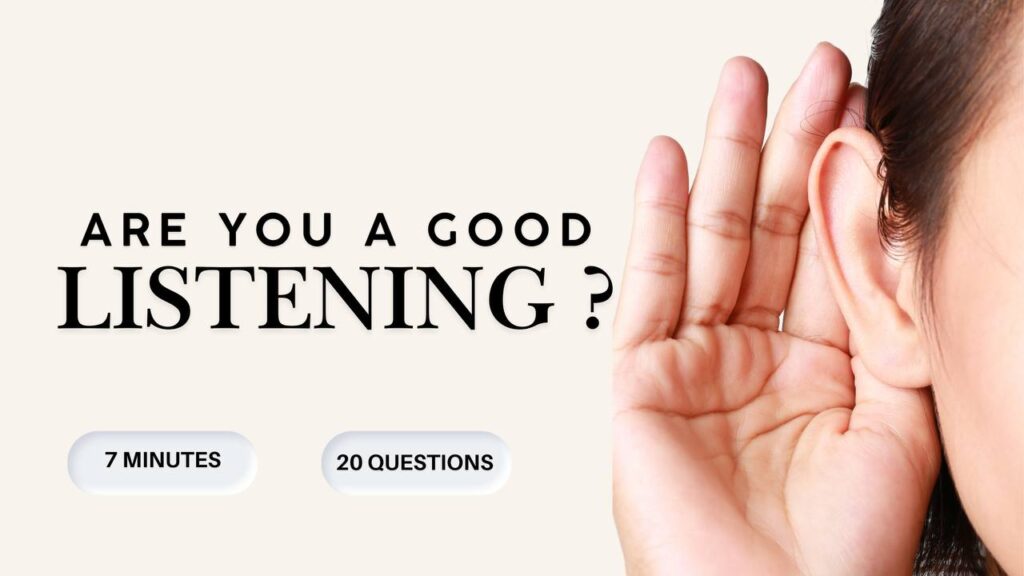
Results
Exceptional Listener
- What This Means: Your responses indicate a strong ability to listen attentively and empathetically.
- Insights:
- Highly skilled at understanding both verbal and non-verbal cues.
- Demonstrates patience and avoids interrupting others while they speak.
- Builds trust and rapport by genuinely valuing others’ perspectives.
- Next Steps:
- Continue leveraging your excellent listening skills to foster deep connections.
- Share your techniques with others who may struggle with active listening.
- Reflect on how your listening abilities contribute to your personal and professional relationships.
Strong Listener
- What This Means: Your responses suggest you have good listening skills, though there may be areas for further growth.
- Insights:
- Attentive to others’ needs and able to create meaningful conversations.
- Occasionally distracted or prone to offering solutions too quickly.
- Generally empathetic but may benefit from deeper engagement in certain situations.
- Next Steps:
- Practice fully focusing on the speaker without formulating responses prematurely.
- Balance empathy with actionable feedback, ensuring the speaker feels heard.
- Seek feedback from trusted individuals on how your listening impacts them.
Balanced Listener
- What This Means: Your responses indicate a balanced approach to listening, suggesting room for growth in attentiveness or empathy.
- Insights:
- Generally listens well but may struggle to engage deeply in certain conversations.
- Balances listening with expressing your own thoughts and ideas.
- May unintentionally overlook non-verbal cues or underlying emotions.
- Next Steps:
- Focus on improving your ability to read between the lines in conversations.
- Work on asking clarifying questions to ensure you fully understand the speaker’s perspective.
- Explore active listening techniques to enhance your engagement.
Developing Listener
- What This Means: Your responses suggest that listening may not always come naturally to you, but there’s significant potential for growth.
- Insights:
- May find it challenging to stay fully present during conversations.
- Often focused on your own thoughts, which can limit your ability to connect.
- Potentially misses subtle emotional cues or the deeper meaning behind words.
- Next Steps:
- Practice active listening by summarizing and paraphrasing what you’ve heard.
- Reduce distractions, such as devices or multitasking, during conversations.
- Commit to being curious and fully present with the speaker.
Struggling Listener
- What This Means: Your responses suggest difficulties in listening effectively, which may impact your relationships and communication.
- Insights:
- Frequently distracted or disinterested during conversations.
- May prioritize expressing your thoughts over understanding others.
- Potentially struggles to empathize or connect with different perspectives.
- Next Steps:
- Reflect on the importance of listening for building trust and understanding.
- Practice mindfulness techniques to improve focus and reduce internal distractions.
- Start with small changes, like maintaining eye contact and nodding to show engagement.
#1. When I am in a conversation, I get distracted by my own thoughts.
#2. In conversation, I shut off my phone to listen carefully.
#3. I refrain from making judgments.
#4. I avoid interrupting the speaker.
#5. Withholding my advice helps me listen better.
#6. I think about my response while a person is talking.
#7. I jump in with my own thoughts if a conversation partner is struggling to explain his point.
#8. I ask questions to understand the information being relayed better.
#9. I am actively listening when a person speaks.
#10. It helps me to paraphrase what is being said to me.
#11. I avoid finishing other people’s sentences.
#12. I pay attention to the speaker’s body language.
#13. I avoid shooting down ideas.
#14. I wait for the person to finish speaking before making up my mind.
#15. I am curious when I listen.
#16. I recall important details from conversations.
#17. I avoid rushing a conversation.
#18. I sometimes have a dismissive response ready when in conversation.
#19. I encourage more dialogue if I can’t understand what the speaker is saying.
#20. I want to understand the perspective of others.
Previous
Finish


